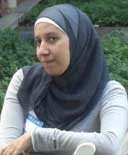‘Bread and Salt’ bring Egypt’s Christians, Muslims closer |
Muslim Brotherhood, Copts promise peace amid fears of unrest
Ieish-o-Malh is trying to counter religious polarization and spreads tolerance and co-existence between Muslims and Copts, Egypt's largest minority group.
"Citizenship is what it's all about. We have basics that we can build no without any ideological enforcement,” reads a handout.
For an appropriate logo depicting the its mandate, Ieish-o-Malh chose a wheat spike that carries 9 grains attached in a wave-like shape. Historically, ancient Egyptians were the first to make bread as the walls of the temples illustrate the process of wheat cultivation and bread making.
The grains number was chosen to be 9, taking as a reference the Egyptian saying “we're all born to 9 months” that symbolizes equity.
"We're reaching out to youngsters who are committed to their religious identities like Ikhwan or Christians who do Church services. Our message is that religious Egyptians who belong to different walks of life should work together for national causes,” said Mohamed Sharaf el-Din.
In a country where religion is believed to have high value and impact, such initiatives of coexistence cannot succeed without direct involvement of religious leaders.
Sheikh Mohab Othman, considered a Salafi or puritan Muslim, strongly supports the work of Ieish-o-Malh which originally comes from his neighborhood.
Weeks after the Egyptian revolution, the team came up with a ‘know each other’ initiative called ‘Agape’, name after a Greek word meaning love.
The Church first agree to consider the invitation but later declined after the Muslim Brotherhood officially called them to a similar dialogue under their umbrella.
However, Ieish-o-Malh is widely recognized in Heliopolis Churches and cultural centers around Cairo, with Sawy Culture Wheel gaining the maximum popularity. Several sessions were held to introduce the group participating in public discussions and conferences promoting diversity difference management.
Activities aren't only limited to Cairo; the team reached out to ‘Masgouna’ village in Southern Giza (Upper Egypt) in the countryside besides some coaching camps in Sinai and Bahariya Oasis.
"We're now looking for funds to keep our projects going. We seek financial support in the context of Corporate Social Responsibility (CSR). We need to register as an NGO with an office where volunteers can work on our projects", said Mohamed.
The boldest and upcoming project is reactivating the religious discourse believing that it reaches more audience than the media. The initial plan targets a group of 20 Imams (prayer leaders) in seven Heliopolis mosques. The prayer leaders would get 160 hours of communication and speech skills in besides skills for better time management and a diploma.
The leading project, supported by Ministry of Awkaf (endowments) and Brotherhood's Deputy Chairman, also has a watchdog to observe and take notes. The team invited some regional Facebook groups to act as observers while the discourse centered on mosques setting community priorities conveyed through Imams’ speeches.
Measuring the impact then, Ieish-o-Malh plans to widen the program to include a total of 50,000 Imams as well as Christian preachers. Adopting one-thing-at-a-time approach, the team is gearing up to launch its branches in different neighborhoods like Shubra that has a high Christian density and Rehab City.








 Hanan Solayman is an Egyptian freelance journalist based in Cairo. She writes for a number of Egyptian & Pan-Arab media outlets such as Daily News Egypt, Community Times, el-Shorouk daily, el-Hayat newspaper, OnIslam website. Besides being a founding member of EMAJ online magazine, she is currently working on an innovative media project in Upper Egypt.
Hanan Solayman is an Egyptian freelance journalist based in Cairo. She writes for a number of Egyptian & Pan-Arab media outlets such as Daily News Egypt, Community Times, el-Shorouk daily, el-Hayat newspaper, OnIslam website. Besides being a founding member of EMAJ online magazine, she is currently working on an innovative media project in Upper Egypt.
Post new comment